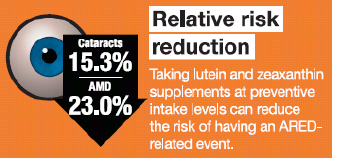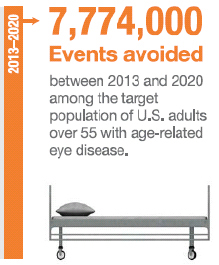 Washington, D.C., May 1, 2014—Age-related eye disease (ARED), such as age-related macular degeneration (AMD) and cataracts, is currently threatening the vision of our elderly population and with limited treatments available for reversing the damage caused by ARED, taking preventive measures is key. A new economic report, “Smart Prevention – Health Care Cost Savings Resulting from the Targeted Use of Dietary Supplements,” points to lutein and zeaxanthin dietary supplements as one of these potentially preventive measures. In addition to reducing the risk of an ARED-related medical event (as found most recently in the AREDS2 study which demonstrated that for those not getting enough lutein and zeaxanthin in their diet, supplementing with those nutrients led to a decrease in advanced AMD progression, a reduction in risk for severe cataracts, and reduction for progression to cataract surgery), the supplement regimen can also save individuals and society money.
Washington, D.C., May 1, 2014—Age-related eye disease (ARED), such as age-related macular degeneration (AMD) and cataracts, is currently threatening the vision of our elderly population and with limited treatments available for reversing the damage caused by ARED, taking preventive measures is key. A new economic report, “Smart Prevention – Health Care Cost Savings Resulting from the Targeted Use of Dietary Supplements,” points to lutein and zeaxanthin dietary supplements as one of these potentially preventive measures. In addition to reducing the risk of an ARED-related medical event (as found most recently in the AREDS2 study which demonstrated that for those not getting enough lutein and zeaxanthin in their diet, supplementing with those nutrients led to a decrease in advanced AMD progression, a reduction in risk for severe cataracts, and reduction for progression to cataract surgery), the supplement regimen can also save individuals and society money.
 “Smart prevention is protecting your health and also protecting your wallet. Age-related eye disease poses risks that are debilitating and expensive, so supplementing with lutein and zeaxanthin can help reduce those risks,” said Duffy MacKay, N.D., senior vice president, scientific and regulatory affairs for the Council for Responsible Nutrition. It was the Council for Responsible Nutrition’s Foundation that provided a grant to the economic firm Frost & Sullivan to conduct the report.
“Smart prevention is protecting your health and also protecting your wallet. Age-related eye disease poses risks that are debilitating and expensive, so supplementing with lutein and zeaxanthin can help reduce those risks,” said Duffy MacKay, N.D., senior vice president, scientific and regulatory affairs for the Council for Responsible Nutrition. It was the Council for Responsible Nutrition’s Foundation that provided a grant to the economic firm Frost & Sullivan to conduct the report.
The report is packed with estimates for the number of medical events that could be avoided and estimates on societal healthcare cost savings—including this impressive statistic: an average of $3.87 billion per year in avoidable health care utilization costs is potentially realizable if all U.S. adults over the age of 55 diagnosed with ARED were to use lutein and zeaxanthin dietary supplements at preventive intake levels.
To achieve the results, Frost & Sullivan conducted a systematic review of scientific studies that focused on studies that looked at the relationship between lutein and zeaxanthin supplementation and the risk of an ARED-attributed event. The firm then projected the rates of ARED-attributed medical events across U.S. adults over the age of 55 with ARED and applied a cost benefit analysis to determine the cost savings if people in this targeted population took lutein and zeaxanthin supplements at preventive intake levels.
The full Frost & Sullivan economic report and accompanying materials, including a lutein and zeaxanthin infographic, are available for free at www.supplementforsmartprevention.org.
Note to Editor:
About the CRN Foundation: The CRN Foundation was established in 2009 as a non-profit 501(c)(3) organization for the purpose of educating people about the beneficial, safe and responsible use of dietary supplements and their ingredients as part of a culture of wellness.
About the Council for Responsible Nutrition: The Council for Responsible Nutrition (CRN), founded in 1973, is a Washington, D.C.-based trade association representing 100+ dietary supplement manufacturers, ingredient suppliers, and companies providing services to those manufacturers and suppliers. In addition to complying with a host of federal and state regulations governing dietary supplements in the areas of manufacturing, marketing, quality control and safety, our manufacturer and supplier members also agree to adhere to additional voluntary guidelines as well as to CRN’s Code of Ethics. Visit www.crnusa.org and www.lifesupplemented.org. Follow us on Twitter @crn_supplements and @wannabewell and on Facebook.
About Frost & Sullivan: Frost & Sullivan, the Growth Partnership Company, works in collaboration with clients to leverage visionary innovation that addresses the global challenges and related growth opportunities that will make or break today's market participants. For more than 50 years, they have been developing growth strategies for the global 1000, emerging businesses, the public sector and the investment community.

